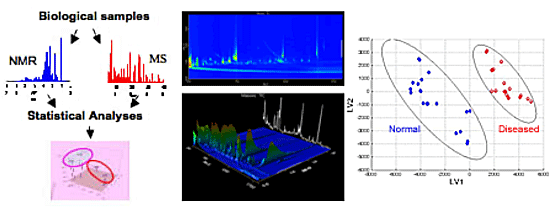Read more about the research at Northwest Metabolomics Research Center…
The emerging area of metabolomics describes the simultaneous detection and quantitative measurement of large numbers of metabolites in biological samples such as normal and pathological tissue and bio-fluids. Detection of multiple metabolites, which are the end products of a multitude of genomic and proteomic functions promise immense applications in early diagnosis, prognosis and molecular level understanding of metabolic pathways associated with many diseases. Our laboratory utilizes and develops the latest technological advancements in nuclear magnetic resonance (NMR) spectroscopy and mass spectrometry (MS) methods for analyzing biological samples from a variety of bio-samples. The complex datasets obtained are analyzed using multivariate statistical analyses. In addition, our lab is involved in the development of new chemical and technical methods for the enhancement of sensitive and selective biomarkers in various cancers and other diseases.
Metabolomics (also known as metabonomics or metabolic profiling) deals with the quantitative analysis of multicomponent mixtures of biological samples, and is focused on establishing metabolic responses of living systems to pathophysiological stimuli or genetic alterations. While vast progress in the fields of genomics and proteomics have provided a wealth of information for understanding the factors that regulate cell physiology and pathology, great insight into the functions of biological systems is also gained through the study of concentrations and fluxes of metabolites.
The quantitative measurement of small molecule metabolites that are the end products of genes, transcripts and proteins functions provides vital information for understanding the composition and function of biochemical networks, and promises solutions to many important questions related to human disease diagnosis, prognosis and therapeutic development. Significant interest in the application of metabolomics-based approaches stems from an ability to detect and quantitatively analyze up to many hundreds of metabolites in parallel, which provides an efficient method for unraveling altered biochemistry, providing mechanistic understanding and even drug targets. Since subtle changes in gene expression or protein levels can cause substantial changes in metabolite concentrations, analysis of metabolites represents a very sensitive measure of biological status. More importantly, metabolomics, through the fingerprinting of biological variations of individuals offers avenues to achieve the goal of “personalized medicine.”
The NW-MRC has comprehensive metabolomics capabilities that include a variety of high-end MS and NMR instruments and bioinformatics resources. The Center serves as a resource offering analytical and instructional expertise in contemporary mass spectrometric and NMR techniques and instrumentation for metabolomics studies. This facility also provides users with “hands-on” training and ready access to suitable instrumentation needed to develop and meet their metabolomics research interests
